“The root of a lot of what I do is the Group of Seven,” Chris Firger says, speaking by phone from his Salem studio after a long day’s work preparing for his upcoming show at the Longstreet Gallery in Eastham. And, indeed, Firger’s landscapes are clearly influenced by the Canadian painters he’s referring to — early 20th-century realists who felt that a distinct national style could be cultivated by focusing on nature.
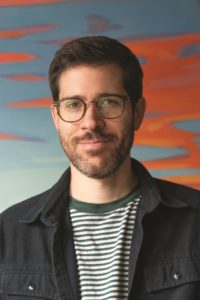
“I went to college in Canada, at McGill University in Montreal, and my wife is Canadian,” says Firger, who was born and raised in Haverhill, an old mill city in northeastern Massachusetts. “The Group of Seven brought this grandiose, bold approach to the landscape — taking what you love about what you’re seeing and pushing it. There’s a pretty healthy landscape-painting tradition up in Canada. It’s about emulating those masters.”
Firger’s own style resembles a cross between Grant Wood and Georgia O’Keeffe landscapes: there’s blocky, geometric abstraction to his shapes and little visible brushwork, and his compositions have a fresh, energetic pop edge. You can feel that love of visual spectacle that references the Group of Seven, whether he’s painting Wellfleet surfers or shoppers in Provincetown. And though he keeps a respectful distance, there’s none of Hopper’s sullenness or alienation.
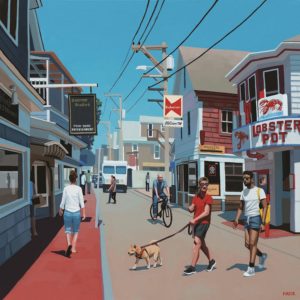
Firger, 31, doesn’t use the esoteric cant of many art-school grads. He’s largely self-taught as an artist, having studied political science in college with a minor in English. “I was relatively good at drawing growing up, but I never thought of it as a career path,” he says.
Finished with school, he lived in Boston and worked in marketing and merchandising. “I wasn’t particularly fulfilled with my nine-to-five life,” he says. “But over the years, I started picking up the paintbrush again. I’d get home from work and paint until late at night.”
The more he devoted himself to art in the evenings, the more he began to see it as a part-time job. “I took workshops with artists I knew, and I joined local art associations,” Firger says. “I started selling at art fairs.”
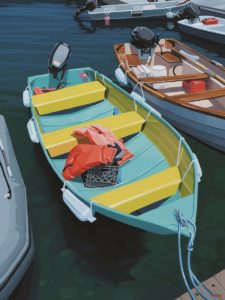
It became obvious what his passion was. “I’d get home at six or seven o’clock and really want to start painting,” he says. “About four years ago, I went full-time. It was a big risk. Fortunately, my wife was super supportive of it. I lucked into marrying someone who saw being an artist as a viable career choice. Her father is an artist.”
Firger nevertheless retains a sober outlook on his new profession. “It’s stressful,” he says. “You’re basically trying to start a small business. Every dollar you earn, you appreciate it more than when it comes from a paycheck. It feels like a privilege to be able to do it.”
He shows at the Copley Society in Boston and is represented by a gallery in Portsmouth, N.H. Longstreet Gallery, which opened last year in Eastham, contacted him initially to join a group show. “They emailed me out of the blue,” he says.
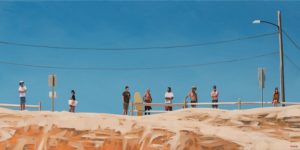
It’s a connection Firger prizes — he came to the Cape every summer with his family growing up. “It was blue-collar, touristy week-long rental type stuff,” he says. “But as an adult, as a painter, I’ve been exposed more to the local side of things. That was the inspiration for the upcoming solo show — looking behind the curtain at what the locals are doing.”
Some of the 16 or so paintings he has completed for Longstreet are of landmark images, such as the Pilgrim Monument — “parts of my childhood memories,” he says. But for other works, he’d turn his sights around and find an unusual composition. While photographing surfers in Wellfleet, for example, he did a 180 and saw a bunch of people standing on the dune watching them. “By turning away from the situation, I made things a little cinematic,” Firger says. The result was the painting Locals, key to the show’s theme.
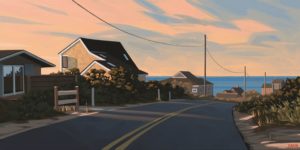
Though Firger enjoys painting in plein air — anywhere from the Canadian Rockies to the coast of Maine — he’ll usually start with a photograph or sketch. “Honestly, doing reference photos and sketches is one of the biggest perks of this job,” he says.
Despite his impressive color sense, “I don’t necessarily have a color palette in mind when I approach a painting,” Firger says. “When I’m focusing on design and composition, it’s the lights and the darks. Color is almost an afterthought.
“When you do that, the color can be anything you want,” he adds. “I want something that’s going to jump off the wall.”
Local Color
The event: “On the Cape,” a show of paintings by Chris Firger
The time: On view through Nov. 28; reception Saturday, Nov. 20, 5 to 8 p.m.
The place: Longstreet Gallery, 4730B Route 6, Eastham
The cost: Free



